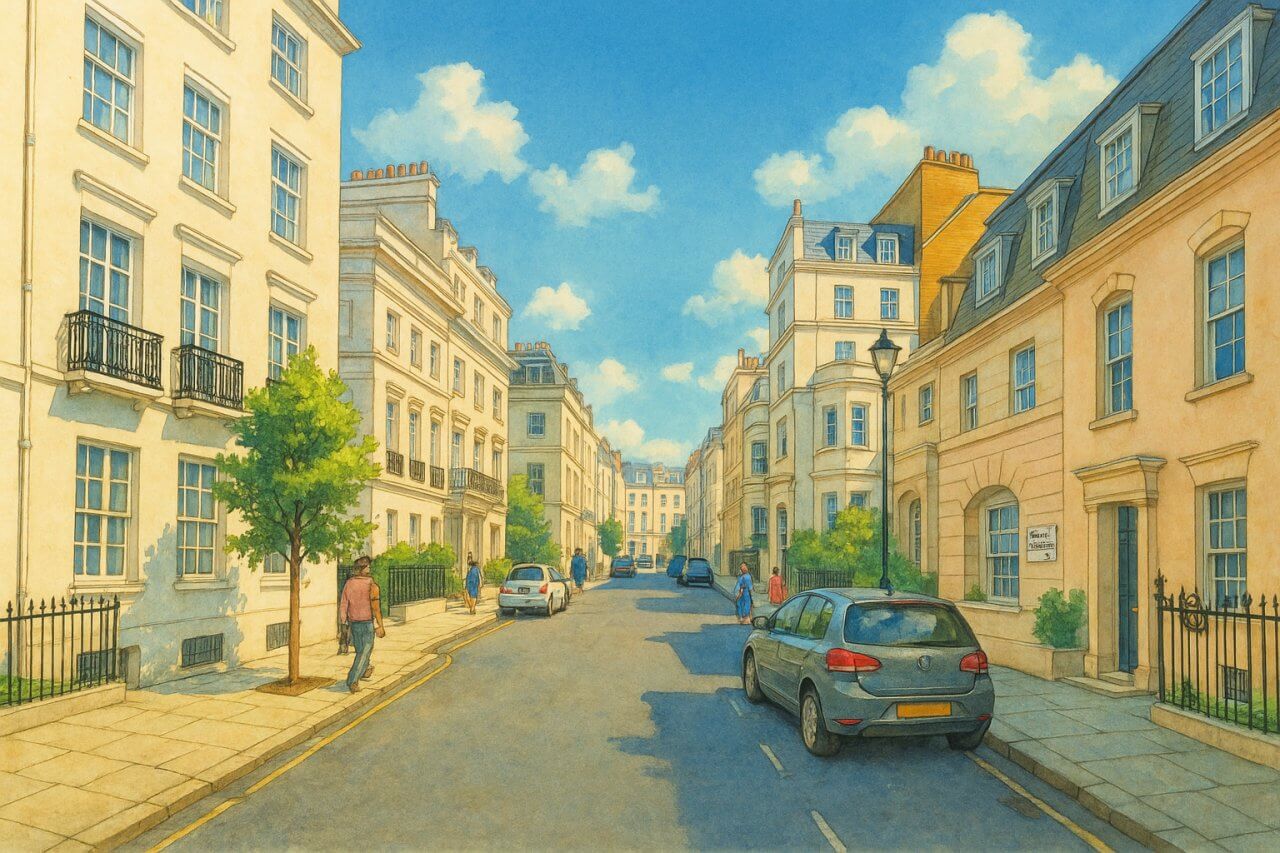
Lyall Street, London
Lyall Street is a charming, one-way street located in the prestigious Belgravia district of London. Connecting Chesham Place in the north to Elizabeth Street in the south, Lyall Street spans a length of approximately 269 metres, offering a quiet and picturesque route in the heart of one of London's most sought-after neighbourhoods.
Length and Traffic Direction
Lyall Street is relatively short, stretching 269 metres (882 ft) in length, making it a convenient yet understated passage in Belgravia. The street is one-way, with traffic flowing from north to south, starting at Chesham Place and continuing towards Elizabeth Street. This configuration ensures smoother traffic movement while maintaining the peaceful atmosphere that the area is known for.
History and Construction
The history of Lyall Street traces back to the mid-19th century when much of Belgravia was developed as a fashionable residential area for London's elite. Belgravia itself was designed by the renowned architect Thomas Cubitt, with construction beginning in the 1820s. Lyall Street, like many of the surrounding streets, was built during this period of expansion and is an integral part of the area’s refined streetscape. Over the years, it has remained relatively unchanged, retaining much of its original architectural character.
Name and Pronunciation
Lyall Street was named after William Lyall, a prominent figure in the 19th century who was associated with the area's development. The name has been in use since the street was established, and it reflects the tradition of naming Belgravia’s streets after notable individuals of the time.
The pronunciation of "Lyall" is fairly straightforward, typically pronounced as “Lyle” (/laɪl/  in the International Phonetic Alphabet). The name is often mispronounced by newcomers, but the standard pronunciation has remained consistent for generations.
in the International Phonetic Alphabet). The name is often mispronounced by newcomers, but the standard pronunciation has remained consistent for generations.
Character of the Road
Lyall Street is characteristic of the Belgravia area, known for its elegant Georgian and Victorian architecture. The road itself is quiet, with a refined atmosphere, offering a peaceful retreat from the hustle and bustle of central London. The street is lined with beautiful terraced houses, many of which have been converted into high-end apartments or offices. Its charming cobbled pavements and well-maintained facades give it an old-world feel, making it a pleasant area for both locals and visitors to explore.
Roads connected to Lyall Street
- Chesham Close
- Chesham Street
- Eaton Mews North
- Eaton Place
- Eaton Square
- Elizabeth Street
- Lyall Mews
Sights Along the Road and Nearby
While Lyall Street itself is not home to major tourist attractions, its proximity to various notable sights in Belgravia makes it a prime location for exploration. A short walk from Lyall Street leads to:
- Belgrave Square – A beautiful garden square surrounded by grand Georgian townhouses, often considered one of Belgravia's highlights.
- Harrods – The world-renowned department store in nearby Knightsbridge, perfect for shopping or sightseeing.
- Victoria Station – Just a short distance away, providing access to various parts of London and beyond.
Real Estate and Property Prices
Lyall Street is located in one of the most exclusive parts of London, Belgravia. As expected, property prices in this area are on the higher end of the spectrum. In 2024, the average price of a property on Lyall Street is estimated at around £3,500 per square foot (approximately £37,500 per square metre). This is significantly higher than the average for London, which stands at around £1,500 per square foot.
The properties on Lyall Street are primarily large, luxurious homes or apartments, often ranging from 1,000 to 2,500 square feet (approximately 93 to 232 square metres). These homes feature spacious interiors, high ceilings, and beautiful period details, making them highly desirable to affluent buyers.
Transportation and Nearby Stations
Lyall Street is well-connected to the rest of London through several nearby public transport options. The closest London Underground stations are:
- Victoria Station (served by the Victoria, District, and Circle Lines)
- Sloane Square Station (served by the District Line)
Both stations are within walking distance, providing easy access to central London and beyond. Additionally, there are multiple bus stops in the area, ensuring convenient travel throughout the city. Popular routes serving the area include the 11, 211, and 319 buses.
Fun Fact
Despite its quiet and residential nature, Lyall Street has become somewhat of a hidden gem for those seeking a peaceful escape in the heart of one of London’s most exclusive areas. It’s known among locals as a “secret” spot for those who enjoy the tranquillity of Belgravia but want to be within walking distance of some of London’s top attractions. The street is often used by tourists to experience the quieter side of Belgravia without the crowds that typically gather at more famous landmarks.
Quick Facts
- Location: Belgravia, London
- Length: 269 metres
- Traffic Direction: One-way, north to south
- Named After: William Lyall
- Average Property Price (2024): £3,500 per square foot (£37,500 per square metre)
- Nearby Underground Stations: Victoria Station (Victoria, District, Circle Lines), Sloane Square Station (District Line)
- Nearby Bus Routes: 11, 211, 319
- Nearby Sights: Belgrave Square, Harrods, Victoria Station
Map of Lyall Street, London

Painting of Lyall Street, London (View image in full size)